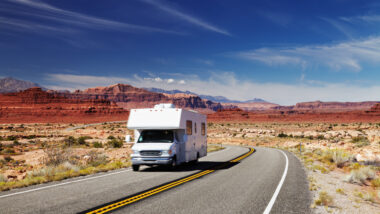Table of Contents Show
Every time you leave your RV, there’s a mental checklist of things you must quickly go through. Turning off your lights and grabbing your keys are essential, but what about your water heater? Do you need to turn it off when you’re away from your rig?
This is a common question we see asked in the community. Unfortunately, some say you should, and others say you shouldn’t. So, which is it?
Let’s find out!
What Is an RV Water Heater?
An RV water heater is precisely what its name indicates; it heats the water inside your RV. They serve the same function as residential units. Thanks to them, you can shower, wash dishes, and do anything that requires warm or hot water.
Like residential models, you can find tank, tankless, propane, and electric models. Many are even combo units, which can run on either propane or electricity.
Generally, a water heater tank can hold anywhere from six to 12 gallons. However, many manufacturers are switching to tankless versions to save space and weight.
Should You Turn Your RV Water Heater Off When Gone?
This is a hot-button topic throughout the community. One side treats their RV water heater the same as their residential one. Do you turn off your residential water heater whenever you leave your house? Likely not.
On the other hand, others turn their units off unless they need to use it. They’ll switch it on 20 or 30 minutes before showering or doing dishes. This gives them time to do their job so it’s ready when they need to use it. So what should you do?
Leaving these appliances on is generally safe and won’t cause any damage to your rig. If you leave it on, you’ll want to ensure you have water in your system. You can ruin the heating element by leaving it on if there’s nothing in the tank.
Just remember that you’ll use electricity or fuel to keep it warm. If you’re worried about the cost of either, turn it off. Those in a campsite who aren’t paying an electric bill can leave it on for their trip. Again, keep water in it, and you shouldn’t have a problem.
How Long Can Water Sit in an RV Water Heater?
You don’t want water to sit in your RV water heater for an extended time. This can lead to bacteria and other microorganisms growing over time.
If you’re taking another trip soon, typically within two weeks, you can let the water sit in the system. Drain it and the rest of your plumbing system if it’s longer than this.
Tips for Protecting Your RV Water Heater
Want your RV water heater to last as long as possible? Here are some things you can do to help protect it and extend its life.
Read the Manual
When you buy an RV, it comes with a tremendous amount of paperwork and booklets. If you’re like most owners, these documents sit in a drawer or cabinet in your RV until something breaks.
While they may not be the most exciting materials, reading them can be beneficial as they contain helpful information for maintaining and caring for the various appliances. You can learn the ins and outs of your appliances to keep them in tip-top shape.
Inspect It Regularly
Even if you’re not a certified RV technician, it can be helpful to inspect your water heater. You can spot frayed wires, loose connections, and any other issues before they become significant.
Look for any changes that might have occurred since the last time you did an inspection.
Regular inspections can be especially helpful if a leak develops. The sooner you can catch the leak, the better. Be sure to address the issue to prevent mold or water damage from developing.
Keep in Mind: Should You Use a Separate Hose for Your Black Water Flush? Let’s take a look!
Flush the Tank
Sediment and minerals can build up in the unit. It’s a good idea to flush them out at the start and end of each camping season. To do this, turn off the heater and give the water time to cool down.
You can then release the pressure relief valve and remove the plug or anode rod. Continue to let it drain until no more water remains in the tank.
You can now use an RV Water Heater Tank Rinser to spray and flush the inside of the tank. These wands connect to a garden hose and can help get the inside of the tank as clean as possible.
- 【Metal Tube】RV water heater flush wand is made of stainless steel and has a rubberized non-slip handle that is cold...
- 【Innovative Design】This RV water heater flush wand can not only spray forward, but also to both sides, which can...
Some RV owners go the extra mile and soak their tank with vinegar. This involves using a 65% vinegar to 35% water solution and putting it into the appliance. Remove the pressure relief valve and put it directly into the tank using a funnel.
Additionally, you can also siphon it directly into the unit. Check your owner’s manual to see the easiest method for your rig.
Check the Anode Rod
If your RV has an anode rod, you must replace it occasionally. This rod protects your water heater from rusting. If it’s reached the end of its life, it will leave it unprotected.
Luckily, replacing the anode rod is very simple. To get started, order the replacement anode rod. Flip the switch to remove the pressure in the tank and unscrew the anode rod.
- Compatible: Compatible with all models Suburban RV Water Heater. Replacement Part for Suburban 232767.
- Corrosion Protection: Extends the life of a water heater by attracting corrosive elements in the water.
Remove the old part and get the new anode rod ready. Before sliding it into place, put Teflon thread sealant tape on the threads. This helps ensure a tight connection and avoid any leaks.
Winterize
If your camper will take a long winter’s nap, you need to winterize it at the end of each camping season. One step in the process is to drain the appliance. Release the pressure, flush the system, and remove the anode rod to ensure no water remains in the tank.
Unfortunately, we’ve heard far too many stories of RVers forgetting to empty their water heater. If you do, it will likely develop cracks or experience significant damage.
Replacing an RV water can cost upwards of $500 to $1000. Properly winterizing your entire rig typically only takes a few hours. Do yourself a favor and take your time to do it right.
Keep in Mind: This RVer winterized their trailer with vodka and The Results Are Hilarious!
Check Ventilation
If your water heater uses propane, it will have an exhaust. Unfortunately, these vents are popular spots for mice and other critters to make nests. Check them regularly to ensure no blockages or anything is in the way.
We’ve heard of fires developing in these systems due to the nests. While checking this exhaust, remember to check your furnace and refrigerator too. This only takes a few seconds but can offer tremendous protection.
Hire a Professional When Needed
Unfortunately, there could be a time when you must hire a professional.
There’s no shame in admitting that you don’t have the skills, knowledge, or tools required to do a particular job. Luckily, plenty of service centers and mobile technicians can get you and your RV back on the road.
Don’t make the mistake of trying to bite off more than you can chew. We’ve heard countless stories of owners trying to save a few bucks by doing repairs themselves.
This can make the situation worse and more expensive. Know when you need to hire a professional and don’t be too proud to give them a call.
Take Care of Your RV Water Heater
Can you get by without a water heater in your RV? Absolutely. However, you’ll eventually want to take a hot shower after a long hike. You can get the dirt and gunk from nature off you with cold water, but it’s not as relaxing.
If you take care of your RV water heater, it’ll likely take care of you.
Do you have any other tips for caring for an RV water heater?
Last update on 2025-01-21 / Affiliate links / Images from Amazon Product Advertising API








